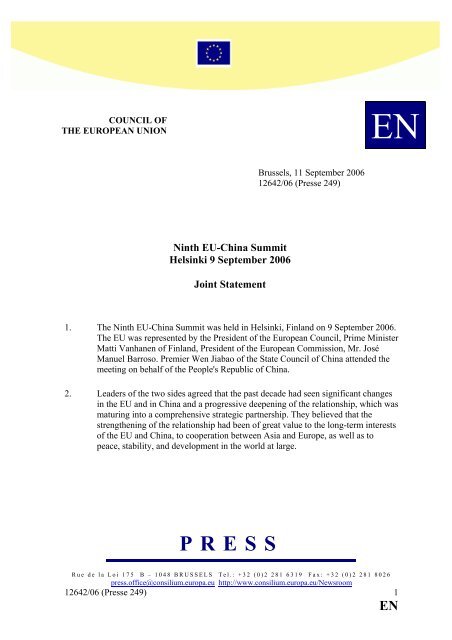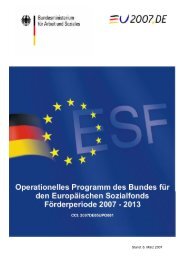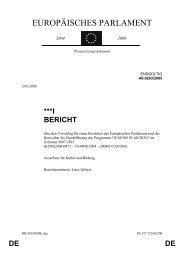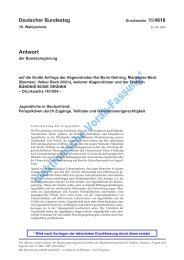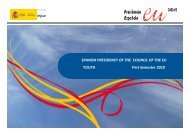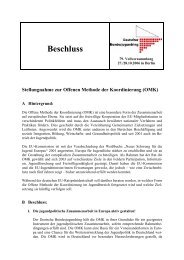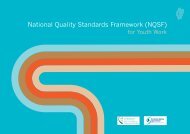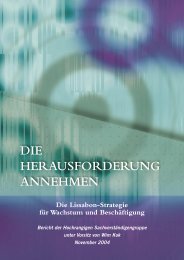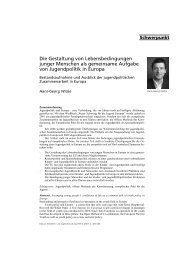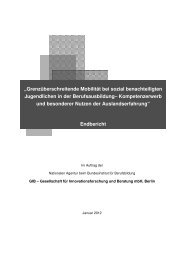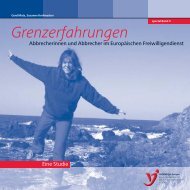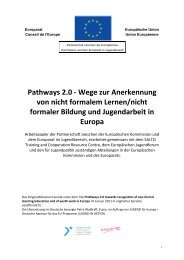Ninth EU-China Summit Helsinki 9 September 2006 Joint Statement
Ninth EU-China Summit Helsinki 9 September 2006 Joint Statement
Ninth EU-China Summit Helsinki 9 September 2006 Joint Statement
Create successful ePaper yourself
Turn your PDF publications into a flip-book with our unique Google optimized e-Paper software.
COUNCIL OF<br />
THE <strong>EU</strong>ROPEAN UNION<br />
EN<br />
Brussels, 11 <strong>September</strong> <strong>2006</strong><br />
12642/06 (Presse 249)<br />
<strong>Ninth</strong> <strong>EU</strong>-<strong>China</strong> <strong>Summit</strong><br />
<strong>Helsinki</strong> 9 <strong>September</strong> <strong>2006</strong><br />
<strong>Joint</strong> <strong>Statement</strong><br />
1. The <strong>Ninth</strong> <strong>EU</strong>-<strong>China</strong> <strong>Summit</strong> was held in <strong>Helsinki</strong>, Finland on 9 <strong>September</strong> <strong>2006</strong>.<br />
The <strong>EU</strong> was represented by the President of the European Council, Prime Minister<br />
Matti Vanhanen of Finland, President of the European Commission, Mr. José<br />
Manuel Barroso. Premier Wen Jiabao of the State Council of <strong>China</strong> attended the<br />
meeting on behalf of the People's Republic of <strong>China</strong>.<br />
2. Leaders of the two sides agreed that the past decade had seen significant changes<br />
in the <strong>EU</strong> and in <strong>China</strong> and a progressive deepening of the relationship, which was<br />
maturing into a comprehensive strategic partnership. They believed that the<br />
strengthening of the relationship had been of great value to the long-term interests<br />
of the <strong>EU</strong> and <strong>China</strong>, to cooperation between Asia and Europe, as well as to<br />
peace, stability, and development in the world at large.<br />
PRESS<br />
Rue de la Loi 175 B – 1048 BRUSSELS Tel.: +32 (0)2 281 6319 Fax: +32 (0)2 281 8026<br />
press.office@consilium.europa.eu http://www.consilium.europa.eu/Newsroom<br />
12642/06 (Presse 249) 1<br />
EN
3. Leaders of the two sides emphasized the importance of high-level political<br />
dialogue and consultations at all levels in enhancing understanding and trust,<br />
expanding common ground, and advancing bilateral relations. They welcomed the<br />
recently established regular strategic dialogue mechanism, which had proven to be<br />
a valuable tool in the frank and in-depth discussions of important international and<br />
regional issues and the exchanges of views on bilateral issues of common concern.<br />
4. In order to reflect the full breadth and depth of today’s comprehensive strategic<br />
partnership between the <strong>EU</strong> and <strong>China</strong>, the two sides agreed to launch<br />
negotiations on a new Partnership and Co-operation Agreement which will<br />
encompass the full scope of their bilateral relationship, including enhanced cooperation<br />
in political matters. These negotiations will also update the 1985 EEC-<br />
<strong>China</strong> Trade and Economic Co-operation Agreement, which will be administered<br />
in a relatively independent manner, taking into consideration the global objectives<br />
of the <strong>EU</strong>-<strong>China</strong> strategic partnership.<br />
5. The <strong>EU</strong> side reaffirmed its continued adherence to one <strong>China</strong> policy and<br />
expressed its hope for a peaceful resolution of the Taiwan question through<br />
constructive dialogue. The Chinese side appreciated <strong>EU</strong>’s commitment to the one<br />
<strong>China</strong> policy and reiterated its principled position on the Taiwan question.<br />
6. Leaders also discussed the <strong>EU</strong> arms embargo. The Chinese side reiterated its view<br />
that lifting the arms embargo would be conducive to the sound development of the<br />
<strong>EU</strong>-<strong>China</strong> relations and urged the <strong>EU</strong> to lift the arms embargo at an early date.<br />
The <strong>EU</strong> side recognized the importance of this issue and confirmed its willingness<br />
to carry forward work towards lifting the embargo on the basis of the <strong>Joint</strong><br />
<strong>Statement</strong> of the 2004 <strong>EU</strong>-<strong>China</strong> <strong>Summit</strong> and subsequent European Council<br />
Conclusions.<br />
7. Leaders reiterated their willingness to develop their cooperation in the fields of<br />
non-proliferation and disarmament, in particular in the preparation for a successful<br />
review conference on Biological and Toxin Weapons Convention in November<br />
<strong>2006</strong> and the upcoming Preparatory Committee for the next review conference of<br />
the Treaty on the Non-Proliferation of Nuclear Weapons. They will continue to<br />
maintain and enhance dialogue and cooperation on the basis of the <strong>Joint</strong><br />
Declaration of the European Union and the People's Republic of <strong>China</strong> on Nonproliferation<br />
and Arms Control which was adopted at the 2004 <strong>EU</strong>-<strong>China</strong> <strong>Summit</strong>.<br />
The two sides noted with great satisfaction their ongoing practical cooperation in<br />
the area of export control.<br />
12642/06 (Presse 249) 2<br />
EN
8. Leaders emphasized the importance of efforts to reform the United Nations<br />
system and their strong support for a fair, just and rules-based multilateral<br />
international system with the UN playing a central role. They reiterated their<br />
commitment to promote world peace, security, sustainable development, and<br />
human rights, as recognized in the 2005 UN World <strong>Summit</strong> outcome document.<br />
The two sides expressed their support for reform which would improve the UN's<br />
ability to cope with new and existing threats and challenges. They will engage in<br />
achieving progress on the reform by consensus and will be committed to ensuring<br />
full implementation of the outcome of the 2005 UN World <strong>Summit</strong>, including by<br />
cooperating with the newly established UN bodies such as the Peace Building<br />
Commission and the Human Rights Council.<br />
9. The two sides underlined their commitment to the protection and promotion of<br />
human rights and continued to place a high value on the <strong>EU</strong>-<strong>China</strong> human rights<br />
dialogue. They underlined the importance of concrete steps in the field of human<br />
rights and reaffirmed their commitment to further enhance co-operation and<br />
exchanges in this field on the basis of equality and mutual respect, while making<br />
efforts to achieving more meaningful and positive results on the ground. The <strong>EU</strong><br />
welcomed <strong>China</strong>'s commitment to ratifying the International Covenant on Civil<br />
and Political Rights (ICCPR) as soon as possible. Both sides confirmed their<br />
commitment to co-operate with UN human rights mechanism and their respect for<br />
international human rights standards provided for in relevant international human<br />
rights instruments including the rights of minorities. In respect of the global fight<br />
against genocide, war crimes and crimes against humanity, they also noted the<br />
importance of the International Criminal Court. The two sides were committed to<br />
supporting the work of the UN Human Rights Council and undertook to<br />
strengthen their communication and coordination in this regard in line with UN<br />
General Assembly Resolution 60/251.<br />
10. <strong>Summit</strong> Leaders welcomed the adoption of United Nations Security Council<br />
Resolution 1701 which led to the cessation of hostilities between Israel and<br />
Hezbollah. United Nations Security Council Resolution 1701 sets the required<br />
framework for a political settlement of the crisis supported by the reinforced<br />
UNIFIL forces in which the <strong>EU</strong> Member States are playing a leading role.<br />
<strong>Summit</strong> leaders urged all parties in the region to play a constructive role in<br />
helping to swiftly implement this resolution. They also stressed their<br />
determination to bring humanitarian assistance to the people of Lebanon.<br />
11. <strong>Summit</strong> leaders emphasized the need for a comprehensive peace plan for the<br />
Middle East. They reaffirmed their support for a negotiated settlement of the<br />
Israeli-Palestinian conflict based on existing agreements which include the<br />
relevant UN Security Council Resolutions and the principles laid down in the<br />
Road Map.<br />
12642/06 (Presse 249) 3<br />
EN
12. Leaders noted the reports by the IAEA Director General on Iran's nuclear<br />
programme and the UNSC Resolution 1696 (<strong>2006</strong>). They called on Iran to<br />
implement UNSC Resolution 1696 (<strong>2006</strong>) and the resolutions of the IAEA Board<br />
of Governors. Leaders welcomed the proposals put forward by France, Germany,<br />
the United Kingdom, endorsed by the United States, the Russian Federation and<br />
<strong>China</strong>, with the support of the European Union's High Representative, for a longterm<br />
and comprehensive arrangement with Iran based on mutual respect and<br />
mutual confidence.<br />
13. Leaders reaffirmed their strong commitment to work towards lasting peace and<br />
stability on the Korean Peninsula, including the peaceful resolution of the North<br />
Korean nuclear issue. Leaders emphasised their wish to see the Six Party talks<br />
process resume as soon as possible and make progress on implementing the <strong>Joint</strong><br />
<strong>Statement</strong> of 19 <strong>September</strong> 2005. They also expressed their grave concern over<br />
DPRK’s recent multiple launch of missiles. They strongly called on all the parties<br />
to take a flexible and pragmatic approach in creating conditions for an early<br />
resumption of Six-Party Talks.<br />
14. Leaders expressed their serious concern about the deteriorating security and<br />
humanitarian situation in Darfur. Leaders emphasized that transition from an AU<br />
to a UN led operation would be conducive to the peace in Darfur.<br />
15. Leaders reiterated their commitment to the Millennium Development Goals<br />
(MDGs) and sustainable global development. Meeting the MDGs will require<br />
urgent action on all sides, among other more ambitious national development<br />
strategies and efforts backed by increased and more effective international support<br />
particularly in Africa.<br />
Leaders also stressed the importance of their relations with Africa, and stated their<br />
commitment to work together in favour of Africa's peace, stability and sustainable<br />
development. The <strong>EU</strong> reaffirmed its attachment to the principles of good<br />
governance and human rights, as embodied in its Africa Strategy. The Chinese<br />
side emphasized the upholding of the five principles of peaceful coexistence, in<br />
particular the principle of non-interference into others' internal affairs.<br />
The Leaders agreed to pursue a structured dialogue on Africa and explore avenues<br />
for practical cooperation on the ground in partnership with the African side,<br />
including with the support of NEPAD initiatives and with the aim of attaining the<br />
Millennium Development Goals. The leaders welcomed <strong>China</strong>'s structured<br />
cooperation with Africa through the Forum on <strong>China</strong>-Africa Co-operation<br />
(FOCAC). Both the <strong>EU</strong> and <strong>China</strong> are signatories of the Paris Declaration on aid<br />
effectiveness. The two parties will continue to promote the effectiveness<br />
principles contained in the Paris Declaration.<br />
12642/06 (Presse 249) 4<br />
EN
16. They also looked forward to a successful 6th ASEM <strong>Summit</strong> on 10 and 11<br />
<strong>September</strong> <strong>2006</strong>. They viewed ASEM as a valuable framework for Asia-Europe<br />
dialogue and cooperation and believed that this <strong>Summit</strong>, which would also mark<br />
the 10th anniversary of ASEM, would take the process forward. They agreed to<br />
continue their close cooperation in promoting ASEM and welcomed <strong>China</strong>'s role<br />
as the host of the 7th ASEM <strong>Summit</strong> in 2008.<br />
17. The two sides reaffirmed their commitment to the fight against terrorism and<br />
reiterated that anti-terrorism action must accord with the purpose and principles of<br />
the United Nations Charter and the norms of relevant International Law and fully<br />
respect human rights. The two sides underlined the leading role of the United<br />
Nations with respect to counter-terrorism, and the importance of the universal<br />
implementation of all UN Security Council resolutions, UN conventions and<br />
protocols related to counter-terrorism. Both sides remain committed to achieving<br />
consensus on the UN Comprehensive Convention on International terrorism and<br />
call upon the UN General Assembly to adopt the counter-terrorism strategy<br />
without delay, as mandated by the World <strong>Summit</strong>.<br />
18. The two sides expressed their concern over the spreading of avian influenza in the<br />
world and their high appreciation for the International Pledging Conference on<br />
Avian and Human Pandemic Influenza held by <strong>China</strong>, the European Commission,<br />
and the World Bank in Beijing at the beginning of this year. They promised to<br />
carry out relevant follow-up actions and agreed to further the cooperation in the<br />
prevention and control of such infectious diseases as avian influenza and<br />
welcomed the recent WHO resolution on the international health regulations. In<br />
addition to the avian flu and to other newly emerging infectious diseases like<br />
SARS, the leaders underlined the importance of increased cooperation to combat<br />
HIV/AIDS. They especially stressed the need for transparency and nondiscrimination<br />
on these issues.<br />
19. Sustainable development is one of the major areas in <strong>EU</strong>-<strong>China</strong> cooperation. The<br />
leaders agreed to step up the exchange of experiences with a view to building a<br />
resource-efficient and environment-friendly society. In this vein, the <strong>EU</strong> will<br />
enhance its cooperation with <strong>China</strong>, backing its efforts in her rapid economic<br />
development, to introduce a circular economy and to safeguard natural resources,<br />
including biological diversity. Leaders agreed that many challenges remained,<br />
including in the areas of sustainable production and consumption, and energy<br />
efficiency. Leaders agreed to intensify cooperation on these areas and on specific<br />
issues such as illegal logging, as an important contribution to the preservation of<br />
natural resources.<br />
12642/06 (Presse 249) 5<br />
EN
20. Leaders welcomed the progress on the implementation of the <strong>EU</strong>-<strong>China</strong><br />
partnership on climate change. The partnership has provided a good foundation<br />
for strengthening dialogue and cooperation between the <strong>EU</strong> and <strong>China</strong> in the areas<br />
covered by the partnership. They agreed to further strengthen the dialogue and<br />
cooperation in this regard including the United Nations Framework Convention<br />
on Climate Change (UNFCCC) processes launched to promote further<br />
development of international climate change policies. They also agreed to work<br />
positively towards a rolling work plan to further implement the partnership,<br />
covering the period 2007-2010. They welcomed closer cooperation on the<br />
implementation of the Kyoto Protocol's Clean Development Mechanism and the<br />
start of cooperation on the research of near-zero emission power generation<br />
technology through carbon dioxide capture and storage. They underlined the<br />
importance of reducing significantly the cost of key technologies and of their<br />
transfer, deployment and dissemination, as well as of taking steps to encourage<br />
and promote sustainable patterns of consumption and production to lessen the<br />
causes and adverse impacts of climate change. To this end, they also stressed the<br />
importance of enhancing cooperation in capacity building. They believed that an<br />
integrated approach to climate change and energy is crucial, and particularly<br />
underlined the need to exploit the synergies between the promotion of energy<br />
security, sustainable energy supply, innovation and reduction of greenhouse gas<br />
emissions to ensure consistency between meeting the ultimate objectives of the<br />
UNFCCC and energy policy goals.<br />
21. Global energy security is crucial to ensuring economic growth and livelihood of<br />
people, maintaining world peace and stability and promoting development<br />
worldwide. The <strong>EU</strong> and <strong>China</strong> share a common concern for ensuring reliable,<br />
economical and sustainable energy supply. In this respect the leaders affirmed that<br />
they will take appropriate measures to further strengthen dialogue and cooperation<br />
on energy in an effort to create a stable, secure, efficient and clean energy<br />
environment to support sustainable economic and social development.<br />
The Leaders emphasized the strategic significance of the <strong>EU</strong>-<strong>China</strong> High Level<br />
Working Group on Energy and the regular industrial conferences on <strong>EU</strong>-<strong>China</strong><br />
energy cooperation. The two sides underlined the importance of continuing to<br />
strengthen practical cooperation, particularly in the framework of the action plan<br />
on clean coal and the action plan on energy efficiency and renewable energy.<br />
22. Both sides were determined to work closely together to resume the WTO Doha<br />
Development Agenda negotiations as soon as possible with a view to achieve<br />
agreement on an ambitious and balanced outcome. Both sides emphasized the<br />
importance of reaching such an agreement, recalling strongly the need for all<br />
WTO Members to make their due contribution.<br />
12642/06 (Presse 249) 6<br />
EN
23. Leaders underlined the importance of a complete implementation of WTO<br />
commitments. They noted that most transition periods for <strong>China</strong> will have expired<br />
in December <strong>2006</strong>, recognized with satisfaction the progress already made, and<br />
acknowledged the importance of remaining work ahead. Both sides underlined the<br />
importance of dialogue and cooperation to solve bilateral trade issues with due<br />
regard to their international rights and obligations.<br />
They recalled that a transparent, open, and predictable regulatory environment is<br />
important in the area of services, as open and efficient services markets serve as a<br />
launch-pad for broader economic activity.<br />
24. They reiterated their commitment to their dialogue to maximize mutual benefits of<br />
such relation by improving market access and increasing investments<br />
opportunities for both sides.<br />
25. Both sides expressed their satisfaction over the progress of the Market Economy<br />
Status (MES) dialogue and the working group and they noted the joint report on<br />
MES to the summit. Both sides look forward to the update of the June 2004 MES<br />
report to be issued by the Commission before the end of <strong>2006</strong> with a view to<br />
deepen the communication of both sides on the outstanding issues which will be<br />
helpful in resolving the MES issue.<br />
26. Leaders reiterated the importance of protecting intellectual property rights (IPR).<br />
In particular, both sides agreed on the need for appropriate deterrence against<br />
piracy and to the effective enforcement of IPR legislation. Both sides expressed<br />
their satisfaction over the communication and cooperation of the past year under<br />
the <strong>EU</strong>-<strong>China</strong> IPR Dialogue and the IPR working group and stood ready to further<br />
the exchanges and cooperation in this field. Both sides also reiterated that they<br />
would strengthen the cooperation and exchanges in the field of geographical<br />
indications.<br />
The two sides recognised the importance of technology for their economic<br />
development and expressed the willingness to strengthen exchanges and cooperation<br />
on IPR protection in this area and support the contractual freedom<br />
between enterprises in the field of technology transfers under the condition of<br />
fairness, reason and non-discrimination.<br />
12642/06 (Presse 249) 7<br />
EN
27. Leaders underlined the importance of a transparent, open, and predictable<br />
regulatory environment. Both sides stressed the value of involving actively<br />
stakeholders in the drafting of technical regulations and in related work. They<br />
welcomed the signature of the Memorandum of Understanding (MoU) on<br />
Administrative Cooperation Arrangements between the General Administration of<br />
Quality Supervision, Inspection and Quarantine of the People's Republic of <strong>China</strong><br />
(ADSIQ) and the European Commission's Directorate General for Health and<br />
Consumer Protection (DG SANCO) in January <strong>2006</strong> and the subsequent<br />
agreement to establish the “<strong>EU</strong>-<strong>China</strong> Food and Consumer Goods Safety <strong>Joint</strong><br />
Committee” with a view to facilitating the implementation of the MoU. Leaders<br />
expected that the Memorandum of Understanding together with the consultation<br />
mechanism and other established forms of cooperation between the two sides in<br />
the fields of food safety/Sanitary and Phytosanitary (SPS) issues and<br />
TBT/industrial product safety would advance sustainable bilateral trade flows. For<br />
this purpose, leaders also agreed to actively work to reduce technical barriers and<br />
obstacles to trade in TBT and SPS areas by, for example, the use of international<br />
standards.<br />
28. Leaders welcomed the <strong>EU</strong>-<strong>China</strong> Business <strong>Summit</strong> to be held in <strong>Helsinki</strong> on 12<br />
<strong>September</strong> <strong>2006</strong>. They were of the view that the Business <strong>Summit</strong> would provide<br />
a key opportunity to enhance economic relations and the business environment<br />
between the <strong>EU</strong> and <strong>China</strong>. Both sides underlined the importance of involving<br />
more actively stakeholders in <strong>EU</strong>-<strong>China</strong> trade and investment related dialogues.<br />
The leaders welcomed the discussions taking place between Chinese and <strong>EU</strong><br />
industry during the business summit and their recognition of the importance of<br />
<strong>EU</strong>-<strong>China</strong> cooperation in promoting innovations, and sustainable development,<br />
including the development of environmental technologies and services.<br />
29. The two sides expressed the common wish to further the <strong>EU</strong>-<strong>China</strong> science and<br />
technology partnership and recognized that the <strong>China</strong> National Long and Medium<br />
Term Plan for Science and Technology Development and the 7th <strong>EU</strong> Framework<br />
Program provided a new opportunity to carry out cooperation of strategic<br />
importance. In this respect, they appreciate the involvement of Chinese<br />
organizations in the <strong>EU</strong> funded five year CO-REACH project, launched in Beijing<br />
in May 2005, to help identify priorities and appropriate channels for future S&T<br />
collaborations between <strong>China</strong> and Europe. The two sides announced that the<br />
"<strong>China</strong>-<strong>EU</strong> Science and Technology Year" activities will be launched in October<br />
<strong>2006</strong> in Brussels, to further promote S&T cooperation for sustainable mutual<br />
benefit. Both sides will create necessary conditions to make the event a success.<br />
The two sides continued to emphasize and highlight the importance of the<br />
cooperation agreement on Galileo between the European Community and its<br />
Member States and the People's Republic of <strong>China</strong>.<br />
12642/06 (Presse 249) 8<br />
EN
The two sides looked forward to the early implementation, with other parties, of<br />
ITER and the further expansion and strengthening of their cooperation in the<br />
relevant fields.<br />
30. Leaders encouraged relevant authorities of the <strong>EU</strong> and <strong>China</strong> to enhance dialogue<br />
and cooperation. The two sides will make good use of the current dialogues to<br />
continue exchanges and cooperation in various fields including environmental<br />
protection, labour and social affairs, development of agriculture and rural areas as<br />
well as the customs.<br />
The two sides fully recognized the Memorandum of Understanding on <strong>China</strong>-<strong>EU</strong><br />
Dialogue on Energy and Transport Strategies signed in <strong>September</strong> 2005 and the<br />
first plenary meeting of <strong>China</strong>-<strong>EU</strong> Strategic Dialogue on Energy and Transport<br />
Strategies held in March <strong>2006</strong>. They stressed the importance of continuing to<br />
foster <strong>EU</strong>-<strong>China</strong> cooperation in this field.<br />
Leaders expressed their satisfaction over the cooperation between the <strong>EU</strong> and<br />
<strong>China</strong> in the field of transport. They emphasized the need to continue the policy<br />
dialogue in the framework of the <strong>EU</strong>-<strong>China</strong> maritime agreement and they<br />
supported the efforts of shipping companies of both sides to run business in each<br />
other's territory. They were of the view that the two sides needed to strengthen<br />
position coordination and cooperation in international organizations including the<br />
International Maritime Organization and the WTO. The two sides expected the<br />
transport services of the <strong>EU</strong>-<strong>China</strong> to deepen exchanges and cooperation in the<br />
above-mentioned fields in the framework of Memorandum of Understanding on<br />
Cooperation in the fields of Road Transport and Inland Waterways.<br />
Leaders welcomed the second round of the <strong>EU</strong>-<strong>China</strong> Financial Dialogue that was<br />
held in Beijing on 25 May <strong>2006</strong>. They reiterated the importance of strengthening<br />
cooperation and coordination in the macroeconomic, financial, and regulatory<br />
areas and agreed that the third round would be held in Brussels in 2007.<br />
Leaders welcomed the newly established sectoral dialogue on regional policy<br />
cooperation and expressed their satisfaction over the <strong>EU</strong>-<strong>China</strong> Regional<br />
Economic Development Seminar held in Beijing. They stressed that practical<br />
cooperation should be carried out within the framework of the Memorandum of<br />
Understanding on Regional Policy Cooperation between the National<br />
Development and Reform Commission (NDRC) and the European Commission<br />
and looked forward to the next <strong>EU</strong>-<strong>China</strong> meeting within this framework which<br />
would take place in Brussels in 2007.<br />
12642/06 (Presse 249) 9<br />
EN
The two sides expressed satisfaction over the progress achieved in the <strong>EU</strong>-<strong>China</strong><br />
Information Society Dialogue and they hoped to step up joint efforts, especially in<br />
the strategic cooperation on high-speed e-infrastructure and its major application,<br />
to promote the development of the information society in the <strong>EU</strong> and <strong>China</strong>.<br />
The leaders welcomed the start of the negotiations for a bilateral agreement on<br />
drug precursors chemical control.<br />
31. Leaders took note of the progress achieved in the area of civil aviation<br />
cooperation since the 8th <strong>Summit</strong> and reiterated the significant prospects of<br />
strengthening cooperation in the aviation sector. In this respect, leaders stressed<br />
the necessity of restoring legal certainty to the existing bilateral air services<br />
agreements between the People's Republic of <strong>China</strong> and <strong>EU</strong> Member States. To<br />
this effect, the leaders called for discussions to continue as a matter of priority as<br />
agreed between the parties. Leaders also stressed the importance and mutual<br />
interest in enhancing technical co-operation in such fields as aviation safety,<br />
security, air traffic management, and air transport market supervision.<br />
32. Leaders underlined that facilitating people-to-people exchanges and combating<br />
illegal migration were a priority for both sides. They emphasized the good mutual<br />
understanding reached at the EC-<strong>China</strong> High-Level Consultations in July. Leaders<br />
also discussed issues of readmission and visa facilitation. They reiterated their<br />
willingness to open negotiations on issues of their respective concern and agreed<br />
to start concrete cooperation on related issues as soon as possible. Leaders also<br />
welcomed significant progress in the implementation of the tourism agreement<br />
(ADS) and encouraged the further intensification of cooperation at appropriate<br />
level.<br />
33. The two sides recognized that the strengthening of educational cooperation served<br />
as the social and cultural foundation for the sustainable development of the <strong>EU</strong>-<br />
<strong>China</strong> comprehensive strategic partnership. The two sides will conduct deeper and<br />
wider cooperation, jointly discuss the mechanism and priorities for future<br />
cooperation, and make an effort to institutionalize such cooperation. The Chinese<br />
side expressed interest in concluding in the future an <strong>EU</strong>-<strong>China</strong> Education<br />
Cooperation and Exchanges Agreement. Leaders endorsed cooperation in<br />
establishing an <strong>EU</strong>-<strong>China</strong> Law School and welcomed the contribution from the<br />
<strong>EU</strong> side. The relevant departments of the two sides will continue to conduct<br />
consultations in this regard with a view to reaching agreement at an early date.<br />
The Chinese side will launch a five-year Chinese Government Scholarship<br />
Program (<strong>EU</strong> Window) from year 2007 on, to provide 100 scholarships per year<br />
to young students from the <strong>EU</strong> in a bid to provide more opportunities for<br />
European students to study Chinese.<br />
12642/06 (Presse 249) 10<br />
EN
34. The leaders also recognised the significance of cultural diversity for sustainable<br />
development, and welcomed the UNESCO Convention on the Protection and<br />
Promotion of the Diversity of Cultural Expressions. The leaders supported<br />
increasing cultural interaction and visits between the <strong>EU</strong> Member States and<br />
<strong>China</strong> and especially encouraged visits by performing groups and artists as a way<br />
to strengthen links between the Chinese and European cultural circles.<br />
35. Leaders recognised the importance of a healthy and developing civil society for<br />
the sustainability of the reform process both in the <strong>EU</strong> and <strong>China</strong>. Leaders were of<br />
the view that the exchanges and cooperation between the <strong>China</strong> Economic and<br />
Social Council (CESC) and the European Economic and Social Committee<br />
(EESC) constituted a part of the relationship. To reinforce existing ties, they<br />
endorsed and encouraged the establishment of a regular roundtable to contribute<br />
to the enrichment and development of the <strong>EU</strong>-<strong>China</strong> comprehensive strategic<br />
partnership.<br />
36. Leaders of the two sides supported the enhancement of exchanges between the<br />
National People's Congress of <strong>China</strong> and the European Parliament and between<br />
the parties, media circles, and think-tanks of the two sides. They also supported<br />
the expansion and deepening of exchanges between young people including, inter<br />
alia, within the framework of the ASEM-process, and encouraged cooperation<br />
between youth organizations in the <strong>EU</strong> and <strong>China</strong>.<br />
12642/06 (Presse 249) 11<br />
EN


